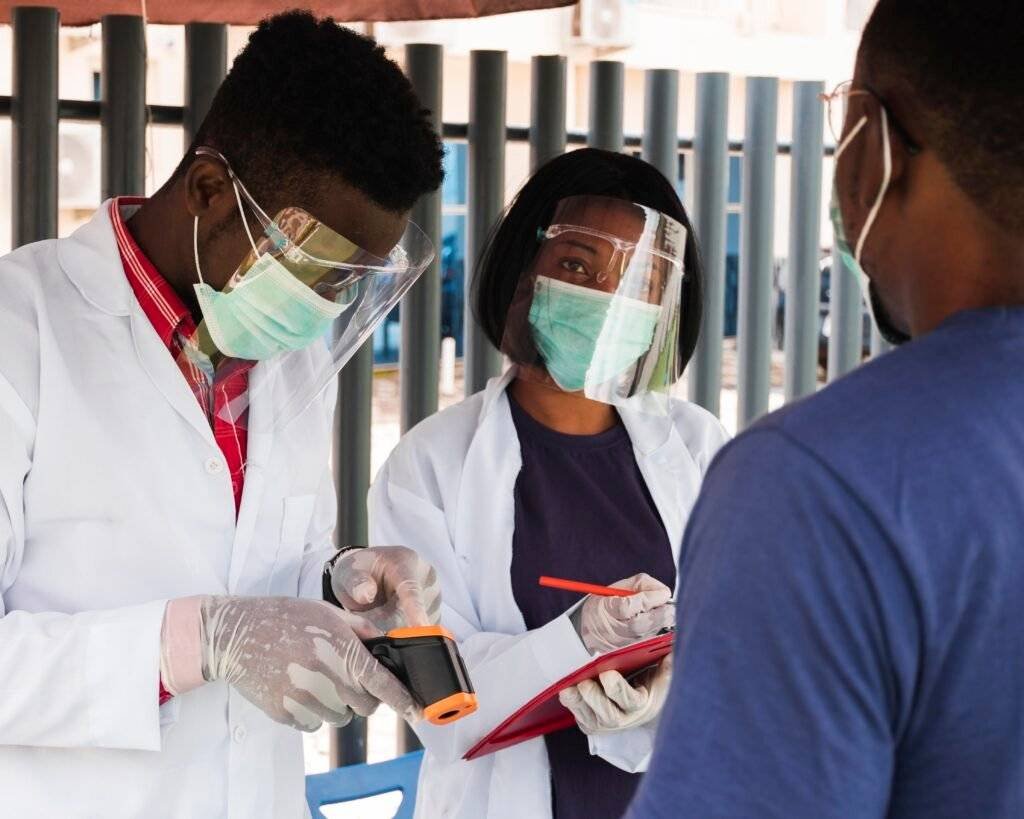Antimicrobial Stewardship in Nigeria for a Healthier Tomorrow
Antimicrobial resistance (AMR) poses a big danger to community health worldwide. The public health crisis extends patient hospitalization periods while escalating healthcare expenses and increasing mortality rates. One of the most effective methods to combat antimicrobial resistance in Nigeria is through Antimicrobial Stewardship ( AMS).
This means using antibiotics properly. Not overusing. Not misusing. It involves doctors, nurses, pharmacists, laboratories, hospital and clinic administrators, as well as patients. Across Nigeria, efforts are growing to increase AMS in the health care centers, and they have initiated responsible antibiotic usage programs.
How do Antimicrobial Stewardship Programs Work
Where Does Antimicrobial Stewardship HAPPEN
Where Does Antimicrobial Stewardship HAPPEN
Antimicrobial Stewardship programs are formally implemented in healthcare settings where patients are seen, and antimicrobials are prescribed. But Healthcare personnel cannot do this alone. Additionally, pharmacists and the general public play a vital role in promoting antimicrobial stewardship within the community.
Local Research Drives Antimicrobial Stewardship Progress
Research studies and the identification of resistant organisms in various areas and regions of Nigeria will help guide antimicrobial stewardship and appropriate antibiotic use. These studies will also help to formulate guidelines on antimicrobial use that can be implemented in different regions of the country.
Some other key research areas include:
- How often are antibiotics wrongly prescribed
- Who prescribes these antibiotics
- Public knowledge about antibiotics and their use.
- At patients. Many people do not know that misuse of antibiotics are fueling resistance and killing fellow Nigerians.
These studies on antimicrobial stewardship in Nigeria support policy change. They guide training programs and government plans. Research gives us real data. That data helps shape stronger national action.
These studies, however, can be costly and difficult to implement, and funding from government and private institutions is vital to their success.


National Strategies Supporting AMS in Nigeria
Nigeria is working to improve antimicrobial stewardship through strong national programs, like the NAP 2.0 AMR (National Action Plan). This plan supports Nigerian antimicrobial stewardship in five key ways:
- Raising public awareness
- Training healthcare workers
- Tracking antibiotic use and resistance
- Setting treatment guidelines
- Supporting research and innovation

Current Challenges Implementing AMS
Multiple obstacles obstruct the development of antimicrobial stewardship in Nigeria. The low level of awareness that mainly affects rural populations is one of the barriers. Most people obtain antibiotics without a required medical prescription. Healthcare facilities typically operate without sufficient staff to properly handle antibiotic administration. There are also inadequate systems to track antibiotics. Existing policies are not consistently enforced. Public misunderstandings actively play a contributing role in this challenge. Most people today consider antibiotics suitable for fighting every kind of illness, although they do not work against viruses. Some stop treatment early or share leftover medicine. These habits increase resistance and make future infections harder to treat. Without urgent action, misuse will continue to grow.

The Way Forward
Education plays a crucial role in enhancing antimicrobial stewardship across Nigeria. Healthcare practitioners require additional instruction about antibiotic usage protocols. The authorities need to implement stricter rules regarding the availability of antibiotics for public purchase. Specific awareness programs should work to correct widespread false beliefs in the population. The public outreach efforts will display situations in which antibiotic treatments are necessary. Hospitals must improve tracking of antibiotic use. Stronger systems are needed to monitor resistance. More funding is required to support AMS programs. National initiatives like NAP 2.0 AMR are important. By taking these actions, Nigeria can build a stronger AMS system.
ANTIMICROBIAL STEWARDSHIP TEAMS
Infectious Disease doctors, Infectious Disease Pharmacists, Microbiology labs, Doctors from other fields, and Nurses are key personnel in the AMS programs.
Nigeria needs to train more infectious disease providers that can assist in AMS programs. Infectious Disease Providers are essential to the fight against AMR.
Infectious Disease Providers
A lot of people think infectious disease doctors treat only infectious diseases that are communicable, like Tuberculosis or malaria, but this is a bit of a misnomer because they treat all types of infections in every system.
They usually work in tertiary care center hospitals as clinical doctors where a lot of complicated infections are seen and they have superior knowledge of pathogens, infections, illnesses, and antimicrobials. They also work in universities, in research facilities, pharmaceutical and insurance companies, in the government to help drive policy, and in NGOs.
ID providers tend to be well-rounded in all aspects of medicine. They are trained in internal medicine or family practice as well as infectious diseases. and some have additional training in public health, epidemiology, microbiology, and tropical and travel medicine. In the hospitals, they are usually consulted by other medical providers, such as surgeons, internists, ob-gyns, and other medical providers, to advise and treat all types of infections. They give recommendations and treat infections in the joints and bones, including in patients that have had surgeries or joint replacements, skin and soft tissue infections, blood infections, pneumonias and other chest infections, infections of the genitourinary and Gastrointestinal systems, central nervous systems, etc.
They usually work hand in hand with clinical infectious disease pharmacists who have had some extra training in infectious diseases, infections, and antimicrobials and both are essential in antimicrobial stewardship programs to use their skills to advice other providers who needs to be treated with antimicrobials, which antimicrobials to give at the right dose for the right duration.
NNAST will help with increasing training programs in ID and scale up the number of ID providers and pharmacists in Nigeria in collaboration with medical institutions and universities, provide ID help remotely and otherwise until Nigeria can sustain this effort by itself.

Antimicrobial Stewardship TEAMS
Infectious Disease doctors, Infectious Disease Pharmacists, Microbiology labs, Doctors from other fields, and Nurses are the key personnel that should be in every AMS program.
Barriers and the Future of AMS in Nigeria
Antimicrobial stewardship in Nigeria is improving despite existing obstacles for its advancement. The existing obstacles create developmental problems which raise the likelihood of antibiotic drug resistance. Knowledge of these obstacles leads to constructing an improved system that safeguards public health throughout the years.

FAQs
Antimicrobial stewardship requires proper antibiotic treatment when necessary along with appropriate doses.
The frequent improper use of antibiotics produces resistant infections throughout the country.
The research devotes attention to antibiotic prescriptions and public knowledge and hospital antimicrobial programs.
Pharmacists support prescription verification processes while educating patients and fighting medication misuse.
What is ANTIMICROBIAL STEWARDSHIP?
In the fight against antimicrobial resistance, there are multiple avenues where interventions can be applied. NNAST will support the government and other agencies who are working to reduce the indiscriminate use of antibiotics. We plan to scale up antimicrobial stewardship, surveillance, and research in the field.
Antimicrobial stewardship is a program that aims to reduce the misuse and overuse of antibiotics and other antimicrobial medications to prevent microbial resistance. These medications are essential for treating infections, but their misuse has led to antibiotic resistance, which occurs when bacteria and fungi develop the ability to resist the drugs that are meant to kill them.
Antimicrobial stewardship programs (ASPs) use a variety of strategies and techniques to optimize the use of antibiotics in hospitals. These programs aim to ensure that patients receive the correct antimicrobial for the right infection , no antimicrobial if there is no infection , at the right time, the right dose, and appropriate minimal duration for their diagnosis.
The task force’s activities in this field will include:
Working with healthcare facilities to establish and strengthen their antimicrobial stewardship programs
Improving the identification of resistant organisms
Coordinating research and surveillance activities on antimicrobial resistance (AMR)
Creating an AMR data platform
Promoting education and enlightenment on AMR in both healthcare personnel and the general public
Capacity building for the Nigerian healthcare systems on AMS.


